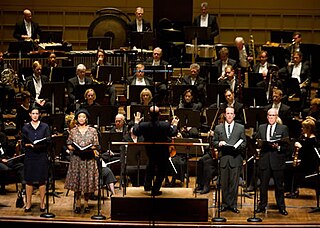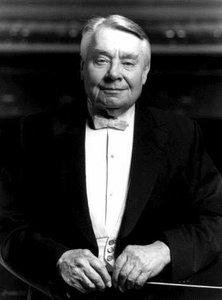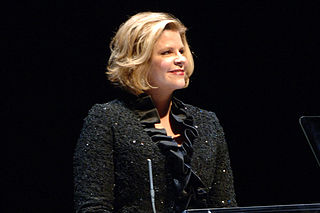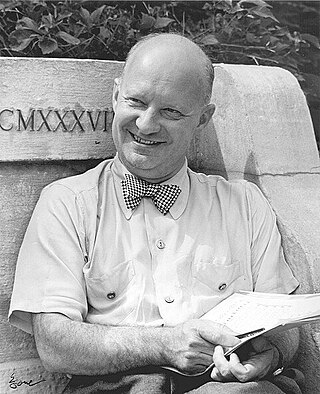
A nocturne is a musical composition that is inspired by, or evocative of, the night.

The Dallas Symphony Orchestra (DSO) is an American orchestra based in Dallas, Texas. Its principal performing venue is the Morton H. Meyerson Symphony Center in the Arts District of downtown Dallas.
Paul Creston was an Italian American composer of classical music.

Robert Lawson Shaw was an American conductor most famous for his work with his namesake Chorale, with the Cleveland Orchestra and Chorus, and the Atlanta Symphony Orchestra and Chorus. He was known for drawing public attention to choral music through his wide-ranging influence and mentoring of younger conductors, the high standard of his recordings, his support for racial integration in his choruses, and his support for modern music, winning many awards throughout his career.
Lowell Liebermann is an American composer, pianist and conductor.

"When Lilacs Last in the Dooryard Bloom'd" is a long poem written by American poet Walt Whitman (1819–1892) as an elegy to President Abraham Lincoln. It was written in the summer of 1865 during a period of profound national mourning in the aftermath of the president's assassination on 14 April of that year.

Sir Stephen Andrew Gill Hough is a British-born classical pianist, composer and writer. He became an Australian citizen in 2005 and thus has dual nationality.
Charles Ives's Symphony No. 1 in D minor, written between 1898 and 1902, is an example of how Ives synthesized ideas from composers who came before him. Many of his later symphonies relied on Protestant hymns as the main theme. However, this symphony is composed in the late-Romantic European tradition, and is believed to contain many paraphrases from famous European pieces such as Tchaikovsky's Pathétique and Schubert's Unfinished symphonies and especially Dvořák's New World Symphony.
Andrew Litton is an American orchestral conductor. Litton is a graduate of The Fieldston School. He studied piano with Nadia Reisenberg and conducting with Sixten Ehrling at the Juilliard School of Music in New York, receiving his Bachelor of Music degree and his Master of Music degree from in piano and conducting. He also received lessons in conducting from Walter Weller at the Salzburg Mozarteum and Edoardo Müller in Milan. His early teachers included John DeMaio. The youngest-ever winner of the BBC International Conductors Competition in 1982, he served as Assistant Conductor at Teatro alla Scala and Exxon/Arts Endowment Assistant Conductor for the National Symphony Orchestra in Washington D.C. under Mstislav Rostropovich (1982-1985), where subsequently he was Associate Conductor (1985-1986). Litton was a participant in the Affiliate Artists Exxon-Arts Endowment Conductors Program. In 2003, he was awarded Yale University's Sanford Medal.
Meriwether Lewis Spratlan Jr. was an American music academic and composer of contemporary classical music.

Susan Graham is an American mezzo-soprano.

Dona nobis pacem is a cantata written by Ralph Vaughan Williams in 1936 and first performed on 2 October of that year. The work was commissioned to mark the centenary of the Huddersfield Choral Society. Vaughan Williams produced his plea for peace by referring to recent wars during the growing fears of a new one. His texts were taken from the Mass, three poems by Walt Whitman, a political speech, and sections of the Bible. A.V. Butcher has analysed Vaughan Williams' use of the Whitman poems in this composition.
Sea Drift is among the larger-scale musical works by the composer Frederick Delius. Completed in 1903-1904 and first performed in 1906, it is a setting for baritone, chorus and orchestra of words by Walt Whitman.
Founded in 1958 by Boris Koutzen and other musicians from the NBC Symphony who were residents of Chappaqua, New York and neighboring towns in Westchester County, the Chappaqua Orchestra annually presents a season of orchestral and chamber concerts. Renowned conductor Andrew Litton's first conducting directorship was with the Chappaqua Orchestra, and the orchestra has also been conducted by Norman Leyden, Wolfgang Schanzer, Jesse Levine, and James Sadewhite. The orchestra has premiered and commissioned works from composers such as Paul Creston, John Corigliano, Lowell Liebermann, Michael Jeffrey Shapiro, Emily Wong, and David Macdonald. Soloists such as Vanessa L. Williams, Ruth Laredo, Joseph Fuchs, Kikuei Ikeda, Jerome Rose, Jon Manasse, Tim Fain, and others have appeared with the orchestra. Michael Jeffrey Shapiro is currently the orchestra's Music Director and Conductor.

Michael Jeffrey Shapiro is an American composer, conductor, and author.

When Lilacs Last in the Dooryard Bloom'd: A Requiem for those we love(An American Requiem) is a 1946 oratorio by composer Paul Hindemith, based on the poem of the same name by Walt Whitman. It is the first musical work to include the entirety of Whitman's 1865 poem. Conductor Robert Shaw and the Robert Shaw Chorale commissioned the work after the 1945 death of President Franklin D. Roosevelt. It received its world premiere on May 14, 1946, at New York City Center, with the Collegiate Chorale conducted by Shaw and soloists Mona Paulee, contralto, and George Burnson, baritone. Paulee performed the work again with bass-baritone Chester Watson and the CBS Symphony Orchestra for the work's first recorded broadcast on CBS Radio on June 30, 1946.
Curtis Curtis-Smith, better known as C. Curtis-Smith or C.C. Smith, was a modernist American composer and pianist.
Secular Cantata No. 2: A Free Song is a cantata for chorus and orchestra by William Schuman, using text by Walt Whitman, that was awarded the first Pulitzer Prize for Music in 1943, after it was premiered by the Boston Symphony Orchestra under Serge Koussevitzky. Music Sales Classical describes it as containing, "granite-like blocks of dissonant harmony and sharp-edged counterpoint."

Charles Clement Fussell is an American composer and conductor of contemporary classical music. He has composed six symphonies and three operas. His symphony Wilde for solo baritone and orchestra, based on the life of Oscar Wilde and premiered by the Newton Symphony Orchestra and the baritone Sanford Sylvan in 1990, was a finalist for the 1991 Pulitzer Prize for Music. He received a citation and award from the American Academy of Arts and Letters in 1992.










